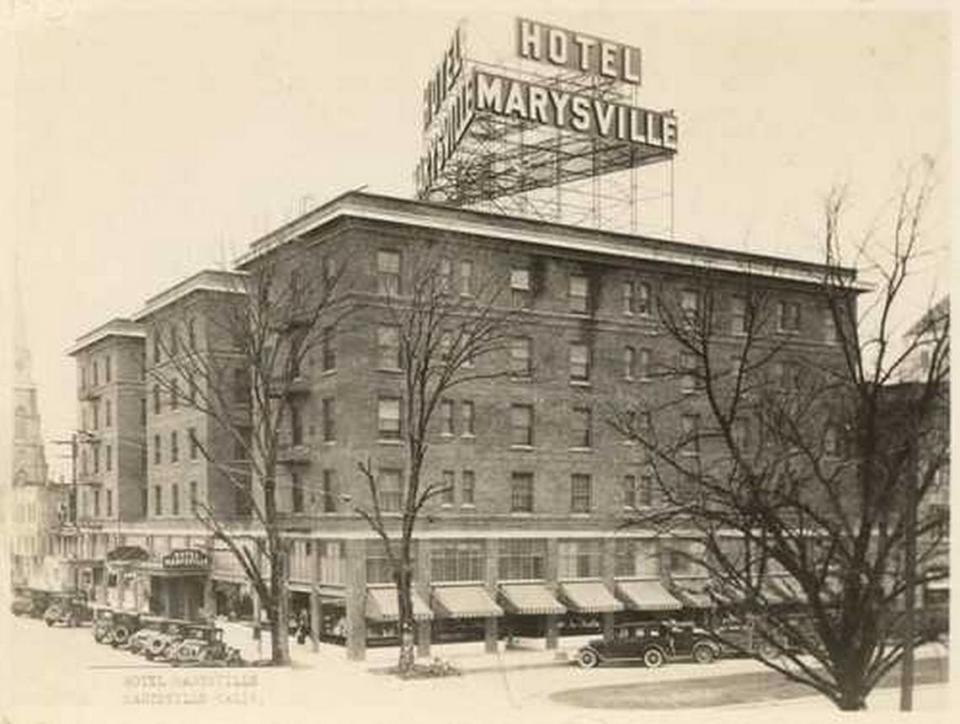Gold Rush-era California town declares emergency due to risk of historic building’s collapse
City officials in Northern California unanimously approved a proclamation Friday declaring a state of emergency after a fire gutted the historic but empty Hotel Marysville, causing a massive diversion of resources in the Sutter County city to ensure safety and trouble for businesses as the structure could collapse.
Flames sparked Saturday in the upper floors of the crumbling structure at the corner of Fifth and E streets that sat vacant for nearly four decades. Firefighters battled the flames in the building, which previously had reports of homeless people starting fires, until Marysville Fire Chief Kyle Heggstrom called off fire personnel because of the structure danger the building and fire posed.
City council members, Marysville Mayor Chris Branscum and City Manager Jim Schaad and Marysville Police Chief Christian Sachs met in a closed session to discuss the threat to public services. Developer Urban Smart Growth offered to donate the building to the city, according to the Marysville Appeal-Democrat.
City officials have not yet determined the next steps, but Schaad said in open session that four to five companies will tour the site next week and estimate demolition costs.
An engineering firm recommended 105 feet of space must be blocked off around the building because it faces a risk of collapse. In response, Caltrans closed E Street, which carries Highway 70 through downtown Marysville, prompting businesses to close and suffer financial losses, said Dan Flores, the city’s community development director.

Some businesses laid off employees and travel times have been seriously delayed, Flores said. The proclamation states there have been traffic delays of up to 40 minutes during peak commute hours, and that a “vast majority” of Marysville’s police resources have been dedicated to traffic control.
“We have ... a devastating impact to the community due to the traffic issues,” Schaad said at Friday’s emergency meeting.
Flores said the city would be declaring the state of emergency in hopes of appealing to the Governor’s Office of Emergency Services to provide financial aid for a city now facing an economic crisis
“This incident, the aftermath, has devastated and taxed the local resources,” Schaad said.
The cause of the fire has not been determined.
The fire was the final nail for the Georgian Revival building that was funded by residents of the once-prosperous mining community nearly a century ago. Despite its grandeur, the Hotel Marysville fell on hard times and closed down in 1989.
The Hotel Marysville was considered the grande dame of downtown buildings in the town that is among the state’s oldest. Designed by San Francisco architect Edward Glass in the 1920s, the hotel was the star gem in the diadem of downtown bars, dance halls, vaudeville theaters and assorted eateries.

It sported a first-class dining room, a coffee shop and a cardroom, according to previous Bee reporting. The main ballroom’s floating dance floor was considered an engineering marvel. It was visited by Sacramento legislators, movie stars and celebrity sportsmen.
For over 50 years, the hotel’s ballroom was the venue for high school proms, firefighters’ balls and society wedding parties.
After the hotel shuttered, consecutive councils sought to tear it down as an eyesore and public health menace.
Over the years, the building has changed hands multiple times with developers proposing a renaissance for the structure — including plans for apartments, Caltrans District 3 offices and mixed-use plans that were never able to get rolling due to the high cost of renovation.
The final renovation plan came a few years ago when the building was purchased by Lance Robbins, founder of Urban Smart Growth. The company had a track record of rehabilitating distressed buildings in Los Angeles and Robbins had a grand vision to create a hub of housing and nightlife for the city at the nationally registered historic landmark.
That proposal faded when Robbins, 76, died last year. The building had been on the market since November with an asking price of $925,000, a fire-sale price for a building likely to cost millions to bring to code.
Surrounding buildings were not damaged by the fire, which Heggstrom said was a more difficult to fight than last year’s blaze at the Glacier Ice Co., which destroyed that Marysville landmark. The “ice house,” as it was known, burst into flames in July and called out a similar response that lasted 18 hours and resulted in the building’s collapse. The cause of that fire remains under investigation.

